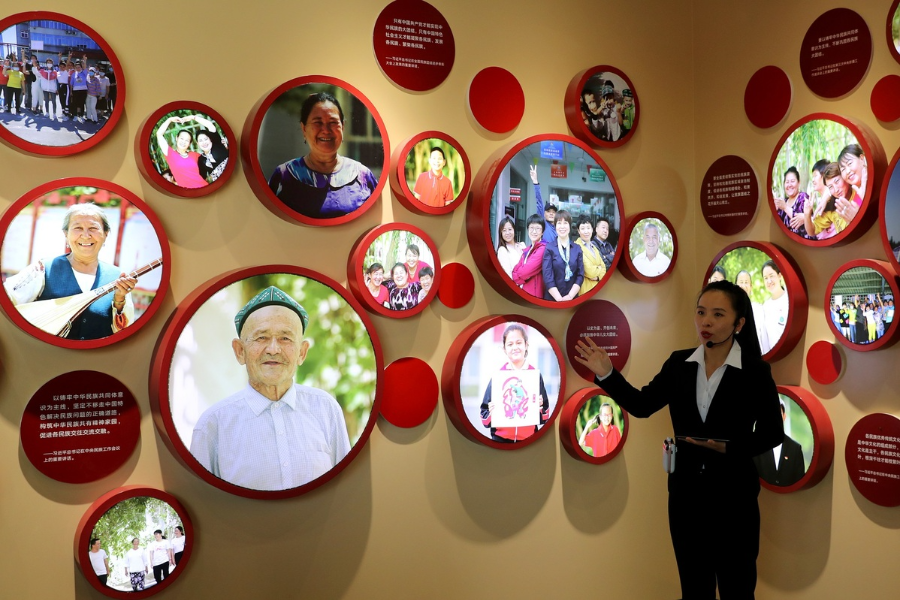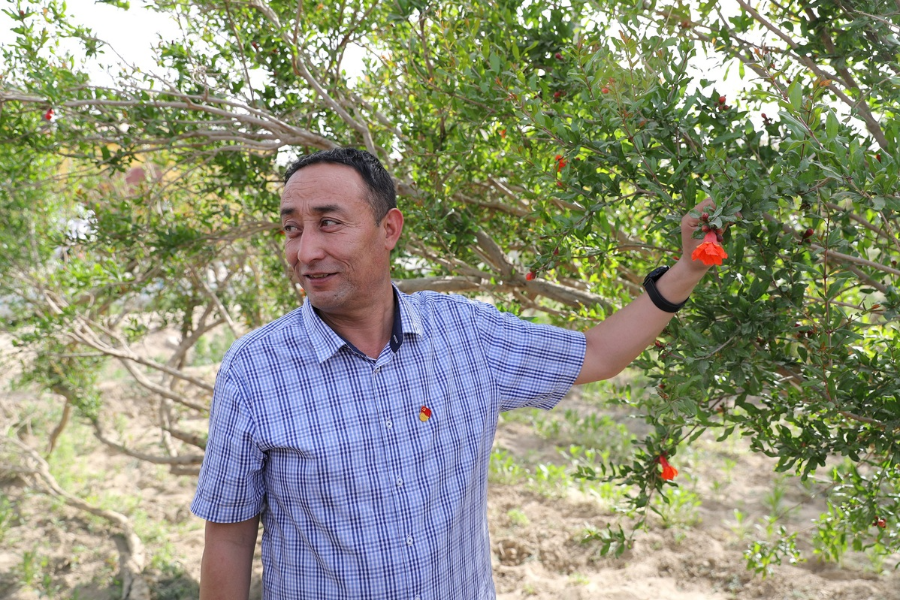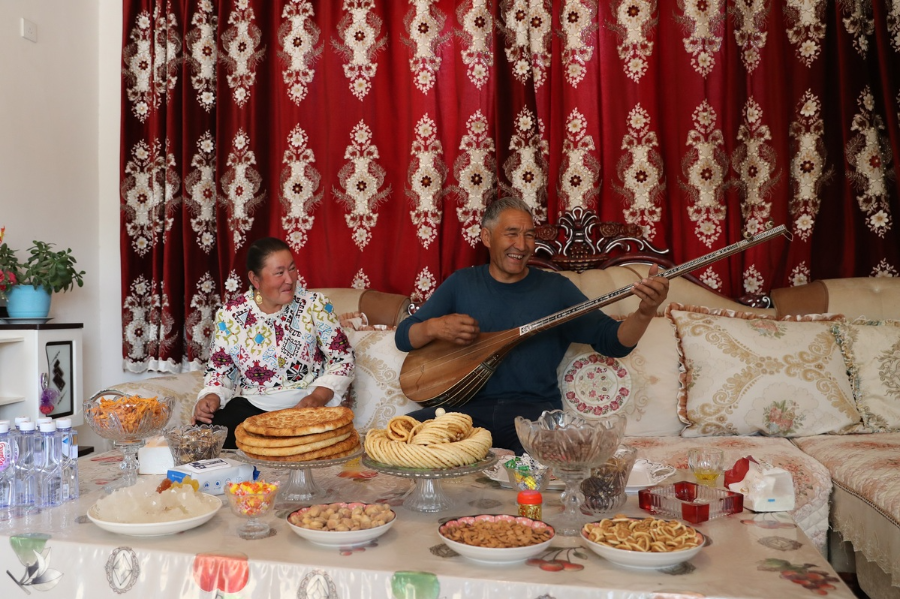
A tour guide gives a presentation at an exhibition hall in Qira county, Hotan. [Photo by Wang Zhuangfei/chinadaily.com.cn]
Paired assistance program matches wealthier eastern provinces with impoverished counties in Xinjiang Uygur autonomous region in China's far west with the aim of providing assistance in terms of economic development, education, healthcare and more. It has long served as a way to advance unity and common prosperity.
One such program, Jinnan New Village, nestles amidst the rolling Gobi Desert in Qira county, Hotan.
In 2014, the village was still vast swathes of wasteland on the southern verge of Taklimakan Desert.
Then a team of officials from the village's namesake district in the port city of Tianjin came from more than 2,000 kilometers away.
They poured tens of millions of yuan into the poverty relief fund for the area and, in just four years, built from scratch a vegetable-growing village with more than 400 greenhouses.
Since 2018, about 370 ethnic Uygur families, mostly herders roaming pastures on the slope of Kunlun Mountains, moved here, into free homes complete with tap water and flush toilets. The village is equipped with a kindergarten and, just two kilometers away, an industrial park built by Tianjin stands ready to offer jobs to the herders-turned-workers.
With aid from mostly ethnic Han technicians sent from Tianjin, villagers learned how to plant tomatoes, trim fig trees and grow cucumbers. Now each greenhouse helps rake in an average revenue of 20,000 yuan ($2,842) annually.
Gulzulnur Turson, 23, was one of those who relocated.
Recently, Gulzulnur and her sister, Ibadat Turson, 26, were checking fig trees in one of the three greenhouses leased to their family three years ago. The family also raises chilis and tomatoes.
The family moved here in 2018 from a secluded mountainous pasture.
Gulzulnur recalled that she had to study at a boarding school in the county seat of Qira, due to the poor transportation.
"I went home just once every two weeks at the time, usually by a car arranged by the school," said the woman, who was later admitted to a college in Urumqi, the regional capital, and now helps out at home.
Gulzulnur said she was preparing for a local civil servant exam, because she said she wants to be close to her parents and occasionally returns and helps out at the family operation.

Memetreyim Memetmin, Party chief of a pomegranate-growing village in Qira county, Hotan, shows off a pomegranate tree flower. [Photo by Wang Zhuangfei/chinadaily.com.cn]
Sitting on an embroidered couch in his 80-square meter home, 50-year-old Rozmemet Abdula was playing the dutar, a two-stringed musical instrument popular among Uygur herders.
Rozmemet and his wife, who have no child, leased three greenhouses to plant chilies and grapes. Apart from the lucrative agriculture, he said the tap water here was a great convenience.
"The water is as clear as bottled water," he said through a Uygur interpreter. "There was no tap water at his home pasture, and the water he used to consume was muddy."
Such paired assistance programs as Jinnan New Village are well documented by multimedia illustrations at a nearby exhibition hall, which was built with help from Tianjin to remember those who contributed to reinforcing unity in Qira.
They include a Uygur farmer who adopted, raised and sent to college a deserted, ethnic Han baby that he had found at a local hospital in 2000.
Another was an ethnic Han businessman, whose date-growing operation in the Gobi Desert created jobs for hundreds of locals and helped turn large tracts of sand dunes into an oasis.
Memetreyim Memetmin, Party chief of a pomegranate-growing village, also earned a place in the hall.
He was elected a deputy to the National People's Congress, the top legislature, between 2013 and 2018, and was received by President Xi Jinping on the sideline of the annual meeting of national lawmakers in 2017.
While showing visitors around the pomegranate orchards, which sits not far from a pomegranate winery built by Tianjin, Memetreyim said that, in 2017, the commercial crop was the theme of the report he had made to the president.
"The president replied to me that people of all ethnic groups should unite together, just like pomegranate seeds," he said.

Farmers work inside a greenhouse in Jinnan New Village of Qira county, Hotan. [Photo by Wang Zhuangfei/chinadaily.com.cn]

Farmers harvest tomatoes in Jinnan New Village of Qira county, Hotan. [Photo by Wang Zhuangfei/chinadaily.com.cn]

A farmer performs using dotar, a traditional Uygur instrument, in Jinnan New Village of Qira county, Hotan. [Photo by Wang Zhuangfei/chinadaily.com.cn]

Children play basketballs at a kindergarten in Jinnan New Village of Qira county, Hotan. [Photo by Wang Zhuangfei/chinadaily.com.cn]

Children engage in playful activities at a kindergarten in Jinnan New Village of Qira county, Hotan. [Photo by Wang Zhuangfei/chinadaily.com.cn]









